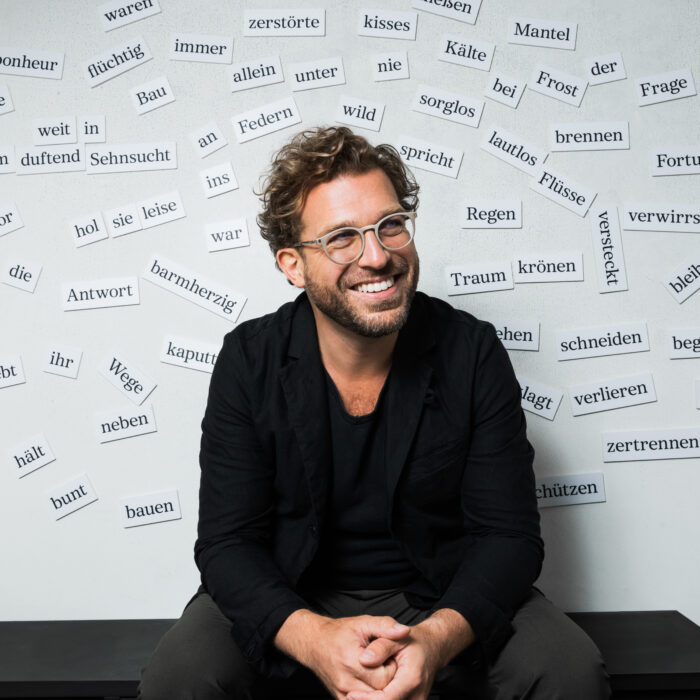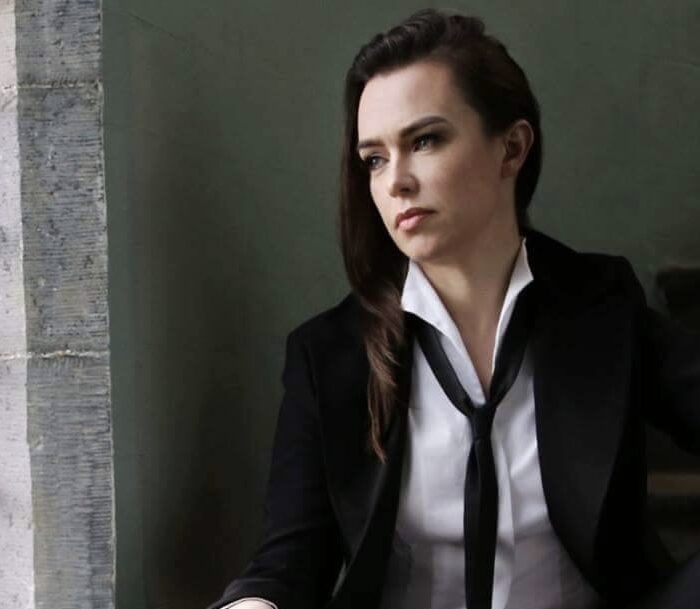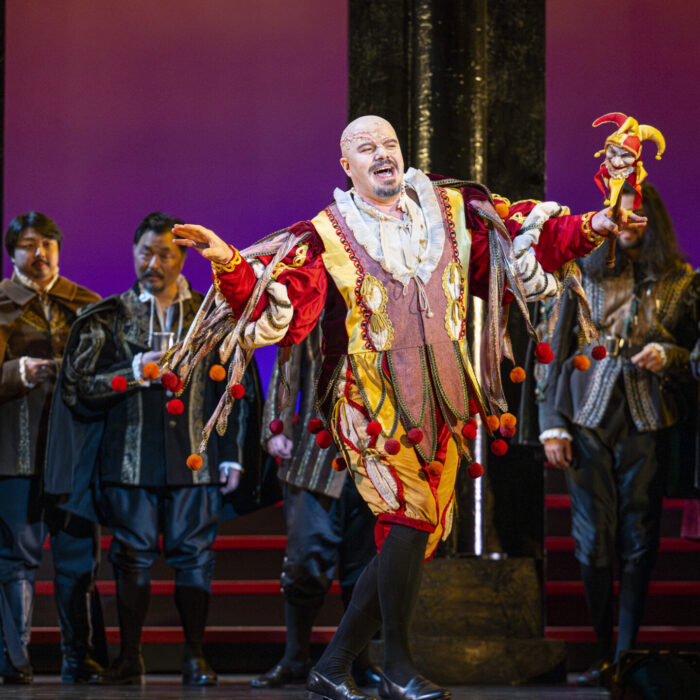
Q & A: Tenor Marco Angioloni On His New CD ‘Dolce Vita’
By Alan NeilsonMarco Angioloni is not a name that is particularly well-known to Italian audiences. Having left Italy 12 years ago to study in Paris, he then chose to establish his career in France and now rarely returns to the country of his birth, at least not for professional reasons. A thoughtful and careful singer, Angioloni has developed his talents in line with his research into baroque singing practices and is now an established baroque tenor, appearing in opera houses and festivals across Europe, including the Beaune and the Potsdam festivals.
He has so far released two CD recordings, designed to showcase his specialist talent in the baroque repertoire: “Il Canto della Nutrice,” focusing on 17th century Italian opera, and “A Baroque Tenor: Arias for Annibale Fabbri” from the 18th century. Recently, however, Angioloni has decided to branch out with a crossover disc entitled “Dolce Vita,” in which he sings popular songs from the early and mid-20th century, an opportune time for OperaWire to talk to him about his career decisions.
OperaWire: You are an Italian singer, yet you perform mostly in France and hardly ever in Italy. Why is this?
Marco Angioloni: The answer is very simple. I came to France almost 12 years ago to finish my studies on the oboe, and it was while I was there that I decided to change direction and study singing. So, although I am 100% Italian, my singing career and all my contacts are in France. I studied at the Centre de Musique Baroque de Versailles, which is a famous school specializing in the baroque repertoire. Also, there are many opportunities for baroque singers and musicians in France. My partner is French, and I like living here, so I decided to stay.
I wouldn’t say it has anything to do with the relative merits of French and Italian baroque music; I like both. In fact, Italian music remains my main repertoire, although I also sing a lot of French baroque as well. I think that it is a plus that I sing Italian baroque music with an Italian ensemble here in France.
Of course, I also sing in Italy, usually, but not always, in Tuscany, as I studied in Florence for three years, but I limit this to about once a year. I have not yet performed in a staged opera in Italy, although I have been asked; unfortunately, my schedule has never allowed for it. The good news is that I shall be making my opera debut next season in Ravenna under the baton of Ottavio Dantone in Monteverdi’s “Il Ritorno d’Ulisse in Patria.”
OW: Were you trained to sing in the French style?
MA: Not at all. I studied in France, but with an Italian teacher named Enzo La Selva. He sang mainly in opera houses around France before settling in the chorus at the Opéra de Paris. Unfortunately, he died last year at the age of 94. I studied with him for five years, and he taught me to sing in the old-school, traditional Italian bel canto style.
Of course, now I have excellent coaches from the Opéra de Paris, and I have also learned the French style, but my technique is very Italian, and I am very proud of it.
My upper register is not very light, and my high notes are sung in full voice and therefore very Italian. In France, some people find my voice very different from the norm, especially at the beginning of my career. They were shocked that I was singing baroque with the full voice, but for me, this is the normal way to sing the baroque, and it is also a very beautiful way of singing the repertoire.
Obviously, I have been trained in both the French and Italian styles and it is natural that both inform the way I sing, but it is primarily founded on the Italian technique and vocal aesthetic.
OW: How would you describe your voice?
MA: I have a pure lyric tenor voice with the ability to sing long phrases with full voice. It is not dark, but nor is it too light and I have the high notes. It is a voice in the same vein as Luciano Pavarotti, Carlo Bergonzi and Beniamino Gigli, although I am not putting myself in the same bracket as them. Thanks to my training as an oboist, I can sustain long phrases. It is also quite a sonorous, powerful and agile voice with a pleasing legato. I am most comfortable singing in the middle register between low F and B♭.
I think that I still need to develop my lower register, which is not particularly necessary for a tenor, but I admit it is not strong at the moment. I am working on it, and it will come, maybe when I change my repertoire; at the moment I focus on the high register for the roles I play, which suits the baroque.
OW: You concentrate almost exclusively on the baroque repertoire. Have you any interest in expanding your repertoire, possibly into Mozart or Rossini roles?
MA: It is something that I would really like to do. Serious Rossini roles would be perfect for me, and I think that now might be the time to make this move. However, my contacts are in the field of the baroque, and it is very unusual for someone to ask you to perform a role that is outside your speciality.
One of the reasons I do my own projects is so that I can explore new roles as well as showcase my talents; it gives people the chance to hear me singing other types of music, as with my latest CD, “Dolce Vita.” I already have a wonderful Rossini program, and I am waiting to find the right orchestra. Also, another program of Italian and French arias from the late 18th and early 19th centuries, including Rossini, Spontini and Piccinni. The most important thing for me is to give myself the opportunity to explore possibilities.
OW: Your first CD recording, “Il Canto Della Nutrice,” released in 2020, is comprised of arias sung by the character of the Nurse found in a number of 17th century operas, including Monteverdi and Cavalli. What were the reasons behind this choice?
MA: As is so often the case, practical reasons play a role; in 17th century baroque, there are very few roles for tenors, with the Nurse being one of them. Another reason for choosing to explore this role was that until 2018 I had not performed the role of a Nurse, and I got the opportunity to sing the character in Telemann’s opera “Richard Löwenhertz” and really enjoyed it; it changed the way I looked at performing characters. It made me want to look at the role of the Nurse in other operas. I was actually amazed that it was something that no one had done before, because there was so much variety and artistic quality here.
OW: Was the idea for the CD your idea?
MA: Yes, and I am very happy with it. When I listen to it now, I can hear how much my voice has changed. It was four or five years ago; it is very musical, and I like my interpretations, as did the critics, who gave many good reviews.
OW: For your second CD, “A Baroque Tenor,” you move forward to the 18th century to sing arias made famous by the tenor Annibale Fabbri. How did this compare to the first album? Did you find this music easier to sing?
MA: It was far easier for me to sing. It was more vocal and more lyrical, but there were some difficulties. It requires more coloratura and a wider register, but generally, it suited my voice more than the first disc. The 17th century repertoire is far more difficult to sing because, even if the score seems relatively simple, it requires perfect support, and you quickly become tired.
OW: What attracted you to Annibale Fabbri?
MA: There are two things that attracted me. Firstly, the music that was written for him sounded like magic to me. I felt a real connection. And secondly, when I started to do research into his career, I found that he was a very interesting person; he was one of the main singers of his era, he was a composer and a very intelligent and artistic man, and he had a very successful career. He was one of the first tenors to become very well-known, as at that time tenors were not so highly regarded.
OW: What is your favorite aria on this recording?
MA: That is really difficult to answer, but I will force myself to choose. I love Handel’s aria “Torrente cresciuto per torbida piena” from “Poro, re dell’Indie,” but also his aria “La speme to consoli” from “Partenope,” which was written especially for his voice, is very good. There is also “La mia gloria ed il mio amore,” an aria from Vivaldi’s opera “Arsilda, regina di Ponto ed il mio amore.” All are beautiful arias that I really love, but I suppose my favorite would have to be “Torrente cresciuto per torbida piena.”
OW: Your latest CD, “Dolce Vita,” is very different from anything that you have done before. You have jumped into a completely different world. You are now singing popular songs from the first half of the 20th century. It is a crossover album. What motivated you to take this path?
MA: Actually, this is an album I have wanted to do for some time. It is completely me! I grew up listening to these songs from a young age. My grandmother used to sing these songs, and my mother used to listen to recordings of them. So, the songs are part of my blood. Even if this is not the typical repertoire for an opera singer, I feel very comfortable with it, and it suits my voice; it does not feel any different vocally to me from singing Rossini or Handel. And, of course, these songs have been sung by the most famous Italian tenors, so there is a history of operatic tenors singing this repertoire. Also, we should remember that these songs were aimed at the same audience as opera.
It also allowed me to show people that I am able to sing music outside the baroque.
OW: What was the criteria for choosing the tracks?
MA: Really, I chose songs that I simply enjoy singing, for example, when I am taking a shower. They are the songs I grew up with.
OW: Track number 13 is “Arrivaderci Roma,” which I believe is sung by the Roma football fans at the stadium when Roma play. Do you support Roma?
MA: I am sorry to disappoint you, but I am not a football fan. However, if they would like to invite me, I would love to sing it before the match.
OW: On your previous recordings, you used the ensemble “Il Groviglio.” For “Dolce Vita,” you have used “Ensemble Contraste.” Why?
MA: When I first came to Paris, there was a huge Virgin megastore, which unfortunately has now closed, and I bought a CD by this ensemble. It was another crossover recording, and I loved it and became a fan of their work. I thought then that one day I would like to work with them. So, when I was working on the program for the CD, I thought that it would be the perfect opportunity to collaborate with them. It was a great decision, as the arrangements for the pieces are fabulous. It was also a logical decision, as it was not the normal repertoire of “Il Groviglio.”
OW: Are you happy with the CD?
AM: Yes, I am very happy. There have been a couple of singles released on digital platforms, and more are scheduled.



